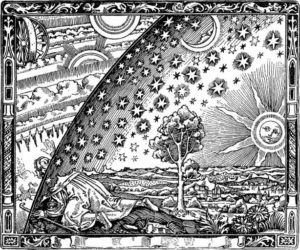We encountered one problem over and over:
The Humanist superstition.
I had great respect for Isaac Asimov’s views.
My students watched his American Humanist videos with me.
Watch the problem my students discovered in our Truth in Two video (full text follows).
It is a superstition to believe humans can bring Heaven to Earth.
Subscribe to “Truth in Two” videos  from Comenius (here). Mark is President of The Comenius Institute (website). Dr. Eckel spends time with Christian young people in public university (1 minute video), hosts a weekly radio program with diverse groups of guests (1 minute video), and interprets culture from a Christian vantage point (1 minute video). Consider becoming a Comenius patron (here).
from Comenius (here). Mark is President of The Comenius Institute (website). Dr. Eckel spends time with Christian young people in public university (1 minute video), hosts a weekly radio program with diverse groups of guests (1 minute video), and interprets culture from a Christian vantage point (1 minute video). Consider becoming a Comenius patron (here).
Picture Credit: Luke Renoe, Snappy Goat
FULL TEXT:
His hair was pure white, a mop sitting atop his brilliant brain. He had written hundreds of books on philosophy, science, and science fiction. Isaac Asimov was a secular humanist, a man who believed that there was no need for God. He belonged to the American Humanist Association and wrote for the humanist periodical Free Inquiry. In my first years of teaching in the 1980s, my students and I engaged Asimov’s articles and documentaries in class.
We had great respect for Asimov even though we disagreed with his viewpoints. Asimov and secular humanists believe in three basic doctrines. One, humans are basically good. Two, humans can become infallible. Three, human infallibility will lead to utopia, a humanist’s creation of heaven on earth.
The famed American author Nathaniel Hawthorne entered a utopian experiment, Brook Farm, in 1841 at Roxbury Massachusetts. The George Ripley farm was a socialist community – all possessions equally held by all participants. The farm was based on the idea that humans are basically good and that goodness can lead to an infallible utopia: heaven on earth. Hawthorne was one of the first to arrive on the farm in the spring of 1841, and the first to leave that same fall.
Why did Hawthorne leave? Ten years later, Hawthorne wrote The Blithedale Romance a semi-autobiographical, fictional account of his time on Brook Farm. Hawthorne explains why the utopian dream would not hold. The problem was one of the human person. He said our nature is “crooked,” what literary critics have called “the human condition.” In theology, we simply call this “sin.”
Utopias fail for one reason: people are inherently corrupt. The reason I disagree with Isaac Asimov and other secular humanists is because I know what Hawthorne knew: humans, by themselves, will never be perfectible.
For Truth in Two, this is Dr. Mark Eckel, President of the Comenius Institute, personally seeking truth wherever it’s found.


